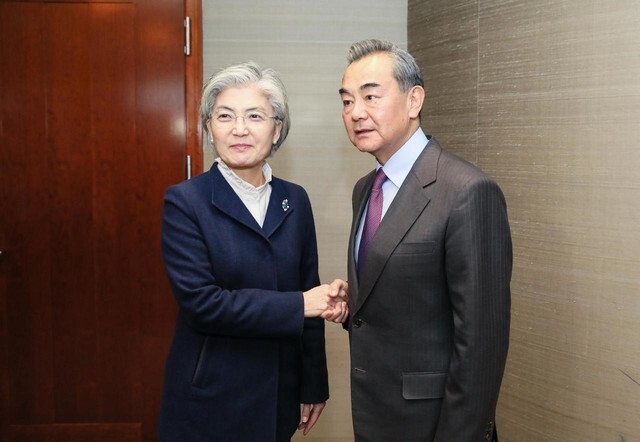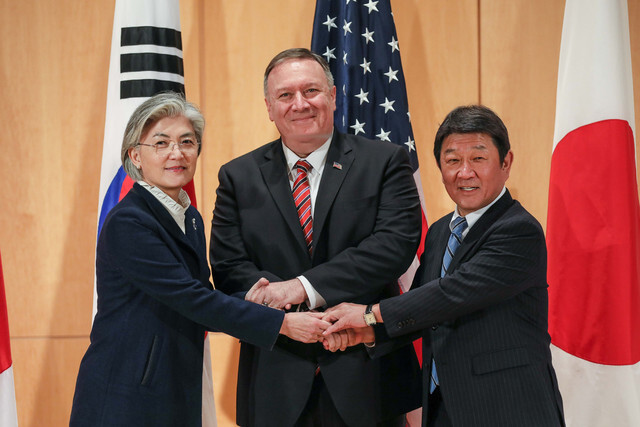hankyoreh
Links to other country sites 다른 나라 사이트 링크
S. Korean foreign minister says Xi Jinping’s S. Korea visit in 2020 to proceed despite coronavirus outbreak

Following a bilateral meeting with Chinese Foreign Minister Wang Yi on Feb. 15 on the sidelines of the Munich Security Conference (MSC), South Korean Foreign Minister Kang Kyung-wha said that Chinese President Xi Jinping will be visiting South Korea in the first half of 2020, as previously agreed by the two countries.
When reporters asked Kang after the meeting whether the outbreak of the novel coronavirus would impact Xi’s visit to South Korea, she said, “Foreign Minister Wang and I confirmed that we remain committed to arranging President Xi’s visit to South Korea, a matter that we’ve continued to work on,” Kang said.
“The exact date [of the visit] hasn’t been finalized yet,” Kang added.
Kang said that she and US Secretary of State Mike Pompeo had “engaged in a brief exchange of opinions about affairs in North Korea and bilateral issues, including the negotiations on our defense cost-sharing agreement” in a brief bilateral meeting that morning.
Kang went into more detail about the defense cost-sharing negotiations. “There’s still a divide between the two sides, but I think that our working-level negotiators have greatly enhanced our understanding of our respective positions. During my meeting with Secretary Pompeo, we came to an understanding that we should exert more political will to help our teams of negotiators agree to more points in their next meeting.”
Kang also told reporters about her trilateral foreign ministers’ meeting with Pompeo and Japanese Foreign Minister Toshimitsu Motegi. “What probably bothers all of us the most is the continuing deadlock in the North Korea-US nuclear talks, and we strongly feel that this situation mustn’t be allowed to go on for much longer,” she said.
“Since North Korea has currently closed its borders because of the COVID-19 outbreak, we’ll have to wait for this situation to be resolved before we can talk about how to bring North Korea to the table for dialogue. The COVID-19 situation prevented us from having an in-depth discussion today, but we’ll continue dialogue at various levels going forward,” Kang said.

During a bilateral meeting with Motegi, Kang reiterated the South Korean government’s position that Japan needs to quickly retract its controls on exports to South Korea and emphasized the need for Japan to take measures that are more tangible and sincere. While Seoul has made clear that its decision not to terminate its GSOMIA information-sharing agreement with Japan as originally planned was a provisional measure aimed at convincing Japan to remove its export controls, sources say that wasn’t specifically discussed during today’s meeting.
“We’ve always conveyed to the Japanese that [suspending the termination of] GSOMIA is a provisional measure,” said an official with South Korea’s Ministry of Foreign Affairs.
Kang and Motegi also expressed the two countries’ positions in regard to an ongoing controversy about Koreans who were conscripted for labor during Japan’s colonial occupation. The two diplomats were in agreement that the two countries should cooperate on their response to the COVID-19 outbreak to facilitate information sharing, and Kang asked the Japanese for their cooperation in regard to South Koreans who are unable to leave the Diamond Princess, the quarantined cruise ship docked at the port of Yokohama.
“While participating as a speaker in the plenary session of the Munich Security Conference, I was able to talk about the importance of multilateralism and share the contribution that South Korea has made. It was an opportunity to convey a message about the Korean Peninsula Peace Process and to seek support from the international community for our plan to turn the DMZ into an international zone of peace,” Kang said.
Kang took part in 10 bilateral and multilateral meetings during her two days at the MSC.
By Park Min-hee, staff reporter
Please direct comments or questions to [english@hani.co.kr]

Editorial・opinion
![[Editorial] Penalties for airing allegations against Korea’s first lady endanger free press [Editorial] Penalties for airing allegations against Korea’s first lady endanger free press](https://flexible.img.hani.co.kr/flexible/normal/500/300/imgdb/original/2024/0502/1817146398095106.jpg) [Editorial] Penalties for airing allegations against Korea’s first lady endanger free press
[Editorial] Penalties for airing allegations against Korea’s first lady endanger free press![[Editorial] Yoon must halt procurement of SM-3 interceptor missiles [Editorial] Yoon must halt procurement of SM-3 interceptor missiles](https://flexible.img.hani.co.kr/flexible/normal/500/300/imgdb/child/2024/0501/17145495551605_1717145495195344.jpg) [Editorial] Yoon must halt procurement of SM-3 interceptor missiles
[Editorial] Yoon must halt procurement of SM-3 interceptor missiles- [Guest essay] Maybe Korea’s rapid population decline is an opportunity, not a crisis
- [Column] Can Yoon steer diplomacy with Russia, China back on track?
- [Column] Season 2 of special prosecutor probe may be coming to Korea soon
- [Column] Park Geun-hye déjà vu in Yoon Suk-yeol
- [Editorial] New weight of N. Korea’s nuclear threats makes dialogue all the more urgent
- [Guest essay] The real reason Korea’s new right wants to dub Rhee a founding father
- [Column] ‘Choson’: Is it time we start referring to N. Korea in its own terms?
- [Editorial] Japan’s rewriting of history with Korea has gone too far
Most viewed articles
- 1Months and months of overdue wages are pushing migrant workers in Korea into debt
- 2Trump asks why US would defend Korea, hints at hiking Seoul’s defense cost burden
- 31 in 3 S. Korean security experts support nuclear armament, CSIS finds
- 4[Editorial] Yoon must halt procurement of SM-3 interceptor missiles
- 5Fruitless Yoon-Lee summit inflames partisan tensions in Korea
- 6[Guest essay] Maybe Korea’s rapid population decline is an opportunity, not a crisis
- 7[Editorial] Penalties for airing allegations against Korea’s first lady endanger free press
- 8Bills for Itaewon crush inquiry, special counsel probe into Marine’s death pass National Assembly
- 9[Column] Can Yoon steer diplomacy with Russia, China back on track?
- 10At heart of West’s handwringing over Chinese ‘overcapacity,’ a battle to lead key future industries